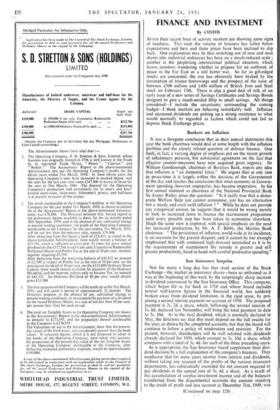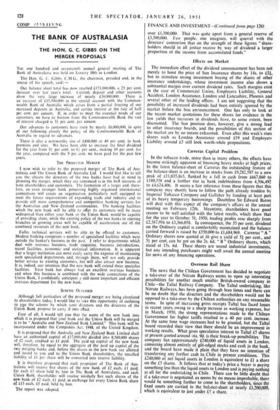FINANCE AND INVESTMENT
By CUSTOS AFTER their recent bout of activity markets are showing some signs of tiredness. This week the volume of business has fallen below expectations and here and there prices have been inclined to slip back. One explanation may be that switching out of iron and steel shares into industrial ordinaries has been on a much-reduced scale ; another is the perplexing international political situation, which leaves investors wondering whether to prepare for an outbreak of peace in the Far East or a still hotter war. So far as gilt-edged stocks are concerned, the rise has obviously been braked by the resumption of trustee borrowings and the prospect of the issue of between £300 million and £400 million of British Iron and Steel stock on February 15th. There is also a good deal of talk of an early issue of a new series of Savings Certificates and Savings Bonds designed to give a much-needed fillip to small savings. All things considered-1 include the uncertainty surrounding the coming budget—I think markets are behaving remarkably well. Inflation and increased dividends are putting up a strong resistance to what would normally be regarded as factors which could not fail to depress Stock Exchange prices.
Bankers on Inflation It was a foregone conclusion that in their annual statements this year the bank chairman would deal at some length with the inflation problem and the closely related question of defence finance. One finds, in fact, a varying degree of emphasis put on the recent growth of inflationary pressure, but substantial agreement on the fact that effective counter-measures have now acquired great urgency. Sir William Goodenough, chairman of Barclays Bank, rejects any idea that inflation is " an elemental force." He argues that at any rate in peace-time it is largely within the decision of the Government of the day and reaches the conclusion that strict economy in Govern- ment spending, however unpopular, has become imperative. In his first annual statment as chairman of the National Provincial Bank Sir Jasper Ridley poses the question: " Is it really true that a demo- cratic Welfare State just cannot economise, just has no alternative but a steady and even swift inflation ? " While he does not provide any categorical answer, he suggests that it would be wrong merely to look to increased taxes to finance the rearmament programme until every possible step has been taken to economise elsewhere. Much the same view is expressd, with special emphasis on the need for increased production, by Mr. A. F. Bibby, the Martins Bank chairman. " The persistence of inflation, world-wide in its incidence, is an occasion for the gravest disquiet, and it cannot be too strongly emphasised that with continued high demand intensified as it is by the requirements of rearmament the remedy is greater and still greater productivity, hand in hand with careful productive spending."
Sun Insurance Surprise Not for many a long day has that staid section of the Stock Exchange—the market in insurance shares—been so enlivened as it was at the beginning of this week by the surprisingly sharp increase in dividend announced by the Sun Insurance Office. This company, which began life as far back as 1710 and whose board includes several well-known figures in the financial world, has suddenly broken away from dividend limitation, in the rigid sense, by pro- posing a second interim payment on account of 1950. The proposed payment is 2s. 2d. a share. which, following the normal interim of Is. 8d. declared last November, will bring the total payment to date to 3s. 10d. As to the final dividend, which is normally declared in May, the directors say that this must depend on the full results for the year, as shown by the completed accounts, but that the board will continue to follow a policy of moderation and restraint. For the present, however, shareholders will be well satisfied with dividends already declared for 1950, which amount to 3s. 10d. a share, which compares with a total of 3s. 4d. for each of the three preceding years.
As is appropriate, the Sun Insurance board supplement their divi- dend decision by a full explanation of the company's finances. They emphasise that for some years income from interest and dividends, without taking any account of the profits of the various insurance departments, has substantially exceeded the net amount required to pay dividends at the annual rate of 3s. 4d. a share. As a result of the accumulation of surplus investment income and of the balances transferred from the departmental accounts the amount standing to the credit of profit and loss account at December 31st, 1949, was
(Continued on page 128)
FINANCE AND INVESTMENT—(Continued front page 126)
over £1,300,000. That was quite apart from a general reserve of £3,500,000. Few people, one imagines, will quarrel with the directors' contention that on the strength of these figures "share holders should in all justice receive by way of dividend a larger proportion of the income from accumulated funds."
Effects on Market
The immediate effect of the dividend announcement has been not merely to hoist the price of Sun Insurance shares by 14s. to £51, but to stimulate strong investment buying of the shares of other insurance undertakings, whose investment income also shown a substantial margin over current dividend rates. Such margins exist in the case of Commercial Union, Employers Liability, General Accident, London Assurance, London and Lancashire, Phoenix and several other of the leading offices. I am not suggesting that the possibility of increased dividends had been entirely ignored by the market before the Sun announcement. One has only to look at the recent market quotations for these shares for evidence in the low yields that increases in dividends have, to some extent, been discounted. The Sun position does, however, give a stron; lead to other insurance boards, and the possibilities of this section of the market are by no means exhausted. Even after this week's rises shares such as London Assurance around f19 and Employers Liability around £5 still look worth-while propositions.
Carreras Capital Problem
In the tobacco (lade, more than in many others, the effects have become strikingly apparent of financing heavy stocks at high prices. In the latest balance-sheet of Carreras the outstanding feature of the balance-sheet is an increase in stocks from £9,282,597 to a new peak of £11,035,865, flanked by a fall in cash from £667,860 to £180,358 and a further rise in bank indebtedness from 4,506,492 to £4,624,406. It seems a fair inference from these figures that this company may shortly have to follow the path already trodden by Imperial Tobacco Company and Gallaher by funding at least part of its heavy temporary borrowings. Doubtless Sir Edward Baron will deal with this aspect of the company's affairs at the annual meeting on February 12th. Meantime, shareholders have good reason to be well satisfied with the latest results, which show that for the year to October 31, 1950, trading profits rose sharply from £2.587,916 to £3,366,058. In consequence, the 35 per cent. dividend on the Ordinary capital is comfortably maintained and the balance carried forward is raised by £350,000 to £1,684,969. Carreras " A " Ordinary shares now quoted at £6 give a yield of 51 per cent., and 5+ per cent. can be got on the 2s. 6d. " B" Ordinary shares, which stand at 15s. 6d. These shares are sound industrial investments, but any intending purchasers might well await the annual meeting for news of any financing operations.
Overseas Rail Share
The news that the Chilean Government has decided to negotiate a take-over of the Nitrate Railways seems to open up interesting possibilities for another much smaller British-owned company in Chile—the Taltal Railway Company. The Taltal undertaking, like Nitrate Railways, has been going through lean times and there can be no doubt that the directors and the shareholders would not be opposed to a take-over by the Chilean authorities on any reasonable terms. In spite of increasing gross receipts Taltal has faced losses in recent years, owing to a sharp increase in working expenses, but in March, 1950, the strong representations made to the Chilean Government for higher tariffs resulted in a 40 per cent. increase. At the same time wage increases had to be granted, but the Taltal board recorded their view that there should be an improvement in working results. What gives speculative interest to Taltal £5 shares at present quoted around 16s. 9d. is their break-up possibilities. The company has approximately £240,000 of liquid assets in London, consisting almost entirely of gilt-edged stocks and cash in the bank, and the board have made it plain that they have no intention of transferring any further cash to Chile in present conditions. This £240,000 of net liquid assets in London is equivalent to £1 a share on the £5 shares. It follows that at today's price a buyer is paying something less than the liquid assets in London and is paying nothing at all for the undertaking in Chile. There can be little doubt that if a take-over is negotiated. as seems by no means improbable, there would be something further to come to the shareholders, since the fixed assets are carried in the balance-sheet at nearly £1,200,000, which is equivalent to just under £5 a share.







































 Previous page
Previous page